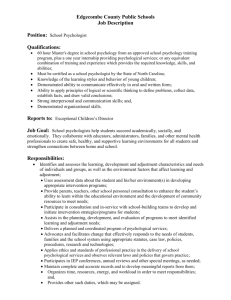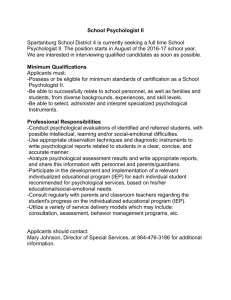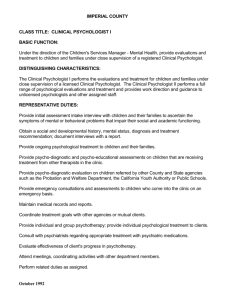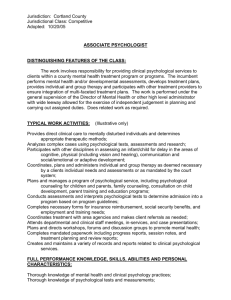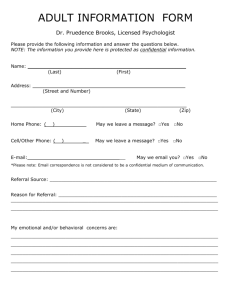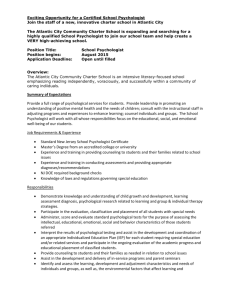Psychological Assessments, Therapy and Intervention
advertisement
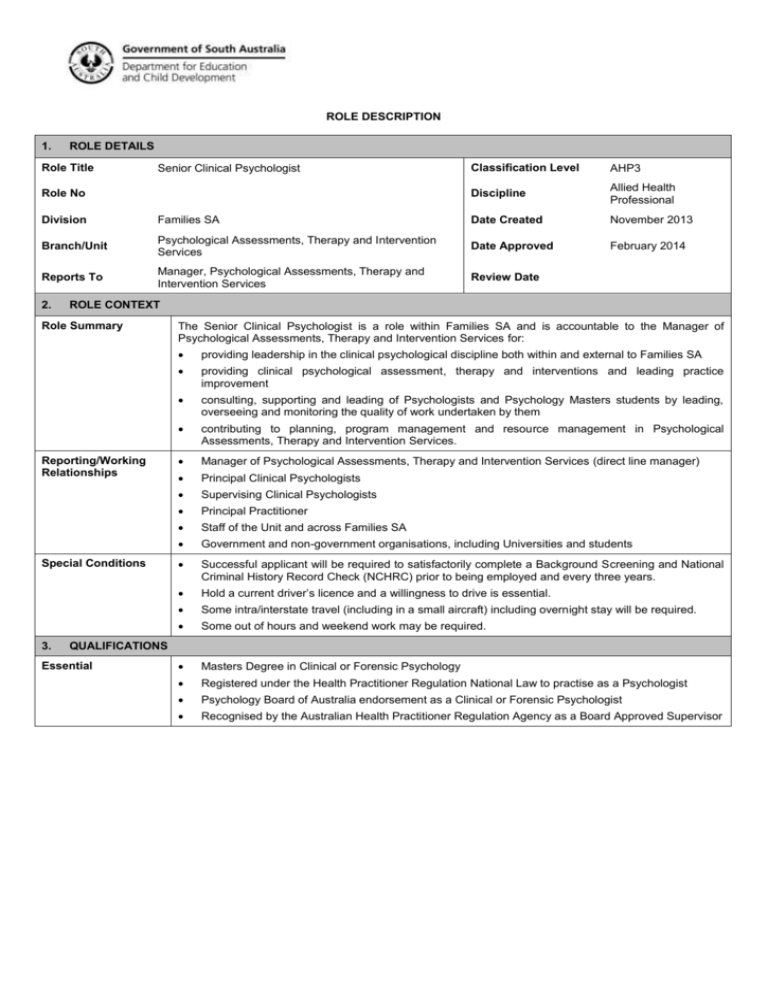
ROLE DESCRIPTION 1. ROLE DETAILS Role Title Senior Clinical Psychologist Role No Classification Level AHP3 Discipline Allied Health Professional Division Families SA Date Created November 2013 Branch/Unit Psychological Assessments, Therapy and Intervention Services Date Approved February 2014 Reports To Manager, Psychological Assessments, Therapy and Intervention Services Review Date 2. ROLE CONTEXT Role Summary Reporting/Working Relationships Special Conditions 3. The Senior Clinical Psychologist is a role within Families SA and is accountable to the Manager of Psychological Assessments, Therapy and Intervention Services for: providing leadership in the clinical psychological discipline both within and external to Families SA providing clinical psychological assessment, therapy and interventions and leading practice improvement consulting, supporting and leading of Psychologists and Psychology Masters students by leading, overseeing and monitoring the quality of work undertaken by them contributing to planning, program management and resource management in Psychological Assessments, Therapy and Intervention Services. Manager of Psychological Assessments, Therapy and Intervention Services (direct line manager) Principal Clinical Psychologists Supervising Clinical Psychologists Principal Practitioner Staff of the Unit and across Families SA Government and non-government organisations, including Universities and students Successful applicant will be required to satisfactorily complete a Background Screening and National Criminal History Record Check (NCHRC) prior to being employed and every three years. Hold a current driver’s licence and a willingness to drive is essential. Some intra/interstate travel (including in a small aircraft) including overnight stay will be required. Some out of hours and weekend work may be required. Masters Degree in Clinical or Forensic Psychology Registered under the Health Practitioner Regulation National Law to practise as a Psychologist Psychology Board of Australia endorsement as a Clinical or Forensic Psychologist Recognised by the Australian Health Practitioner Regulation Agency as a Board Approved Supervisor QUALIFICATIONS Essential 4. PRIMARY OUTCOMES AND ACCOUNTABILITIES KEY RESPONSIBILITIES RELATED TASKS Clinical Psychological Services Provide a range of clinical assessment, consultancy and psychological therapy and treatment services for Families SA clients. Provide detailed psychological reports, participate in panels and case conferences and provide expert testimony, ensuring that parties are well advised regarding the status and needs of the clients. Work closely with the Supervising Clinical Psychologist and Principal Clinical Psychologist to ensure psychologists provide effective and efficient clinical psychological assessments and where appropriate, the provision of therapy to clients. Provide specialist psychological consultation to Families SA field officers engaged in working with clientele for whom the Department has a mandatory or statutory responsibility. Summarise and interpret previously documented information, clinical interviewing, observing behavioural interactions and administering and interpreting standardised psychometric assessment measures. Take a lead role in the development and delivery of training. Intervention Programs Contribute to the planning, implementation, development and evaluation of programs and services to provide efficient and effective service. Provide guidance and assistance to staff and carers through specialist consultation. Document, interpret and integrate information about clients to design, implement and monitor therapeutic programs and interventions that are culturally and socially relevant. Assist in the development, implementation, monitoring and evaluation of plans for the management of clients who display difficult behaviours. Work with the Principal Clinical Psychologist and Supervising Clinical Psychologist to design, implement and monitor therapeutic programs and behavioural interventions so that they are relevant to the cultural and social context of the children and their community. Support young people to gain and implement skills that assist in addressing their circumstances. Relationship Management Build and maintain strong working relationships and networks. Participate in research and consultation processes that inform policy development. Work closely with the Principal Clinical Psychologist and Supervising Clinical Psychologist to ensure professional development of staff. Assist the Supervising Clinical Psychologist in providing supervision and support to students. When necessary, and in consultation with the Manager Psychological Assessments, Therapy and Intervention services, assist the Supervising Clinical Psychologist with the management of their team’s workload. Professional Contribution Provide specialist advice, assistance and consultancy services to management and staff. Assist in the design, construction and validation of assessment and intervention procedures and the selection and adaptation of alternate methodologies. Contribute to clinical practice development and review. Participate in working parties and interagency committees and represent the agency on matters pertaining to psychological practices as required. Organisational Contribution Understand and follow workplace safety initiatives, identify hazards and contribute to a safe working environment, as well as follow procedures to manage and minimise risks within the agency. Follow the principles of a sustainable working environment by following departmental greening initiatives. Model ethical behaviour and practices consistent with SA Government Code of Ethics for Public Sector Employees and agency stated values. Page 2 5. COMPETENCIES (D) Relating & Communicating Client Focus Achieving Objectives Personal Drive & Professionalism Continuous Improvement Respect and Cultural Support 6. Develop strategic networks to increase team/unit effectiveness and achieve departmental goals. Communicate clearly on complex issues with key stakeholders. Encourage and support team members to share experience, knowledge and best practices. Promote and model high standards in client service. Provide team/unit with resources and information to provide high quality client services and address the cultural needs of clients and those clients with a disability. Identify trends and developments that may affect the department’s ability to meet current and future client needs. Guide and support team/individuals to achieve goals on time and maintain high performance standards. .Prioritise work loads of individuals/team and implement strategies to manage time effectively. Develop clear performance guidelines to provide role clarity and team/individual direction. Establish links between operational and strategic goals, and the organisational values. Inspire and motivate others to achieve organisational values by modelling appropriate behaviours and actions. Recognise high potential employees and provide appropriate feedback. Lead change and develop new concepts and procedures to improve services and maximise performance. Promote information sharing, and contribute to developmental processes. Encourage and lead others to provide innovative solutions and challenge current policies or procedures. Take action and provide services that are inclusive of Aboriginal people and people from culturally and linguistically diverse backgrounds as well as engaging in learning about other cultures to better establish relationships and improve services. Engage in practices that build and support a culturally competent workplace by utilising culturally relevant assessments, tools and resources, interventions and processes specific to your practice area. Be aware of Aboriginal cultural practices and/or differences and seek cultural consultation to promote inclusive practice. ROLE SPECIFIC COMPETENCIES 1 Clinical Leadership Experience - utilise experience in providing clinical leadership, fostering professional development, and identifying and meeting training needs. 2 Diagnostic Techniques and Therapeutic Interventions Experience – utilise experience in diagnostic techniques and in planning, developing, implementing and evaluating therapeutic interventions aimed at meeting the needs of clients. 3 Knowledge Base - demonstrate sound knowledge of attachment theory, the effects of abuse and neglect on children and young people, neurobiology, child development, psychological disorders and interventions, and clinical and forensic assessment techniques, such as clinical interviewing, observation, psychometric testing, case conceptualisation and clinical reasoning. Also demonstrate sound knowledge of factors that may place families at risk, such as mental health issues, drug and alcohol abuse, domestic violence, intellectual disability, family dysfunction and intergenerational abuse, and an ability to articulate how this impacts on practice in the child protection and young offender areas. 4 Knowledge Transfer – utilise experience in providing oral and written opinions and/or reports incorporating psychological knowledge and theory to clients, staff and the Courts. 5 Cultural Interventions- facilitate the implementation of culturally appropriate models of intervention for Aboriginal young people and their families. 7. DELEGATES APPROVAL ASSESSED BY: Date: Signature: APPROVED BY: Date: Signature: Page 3
